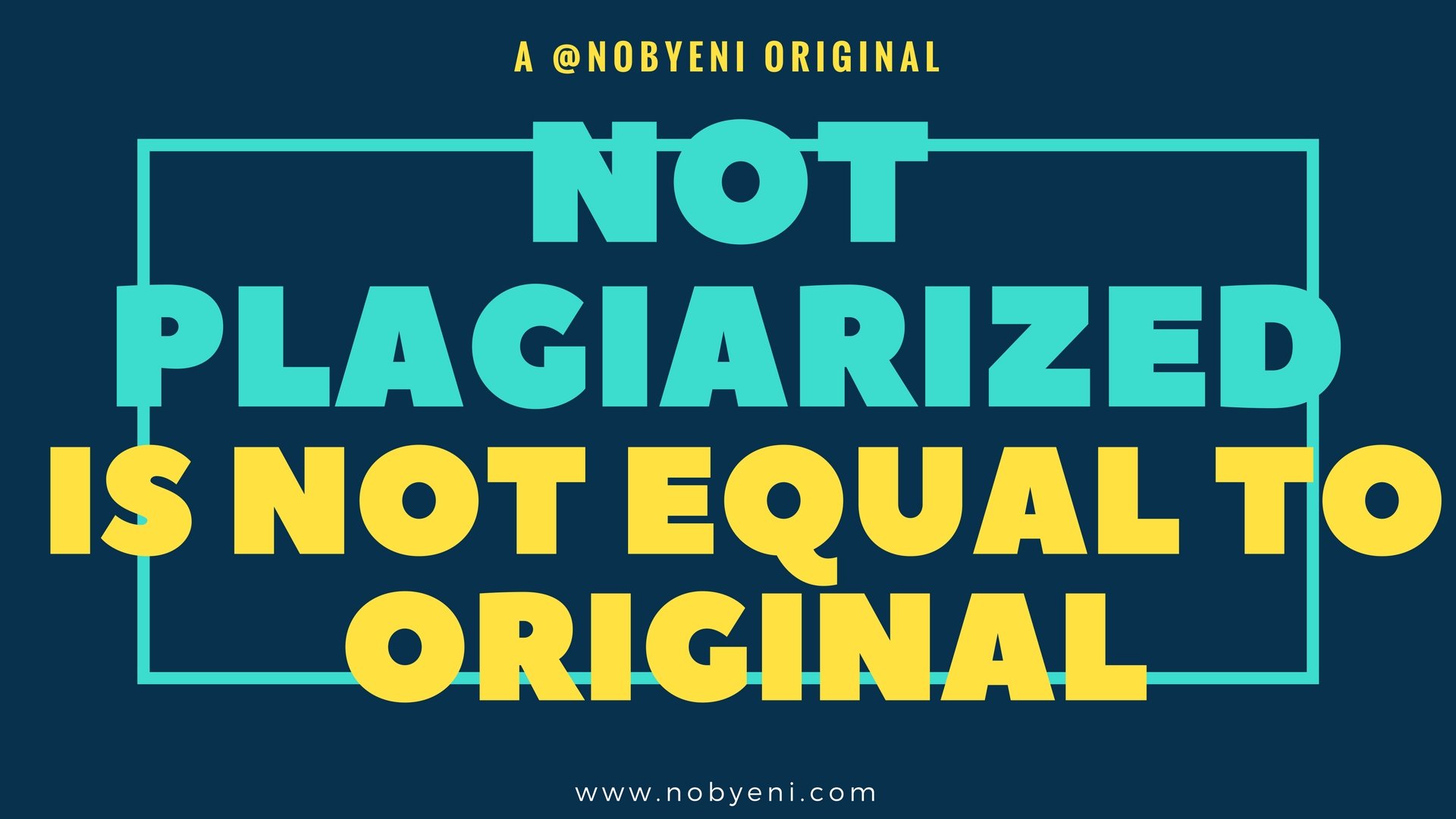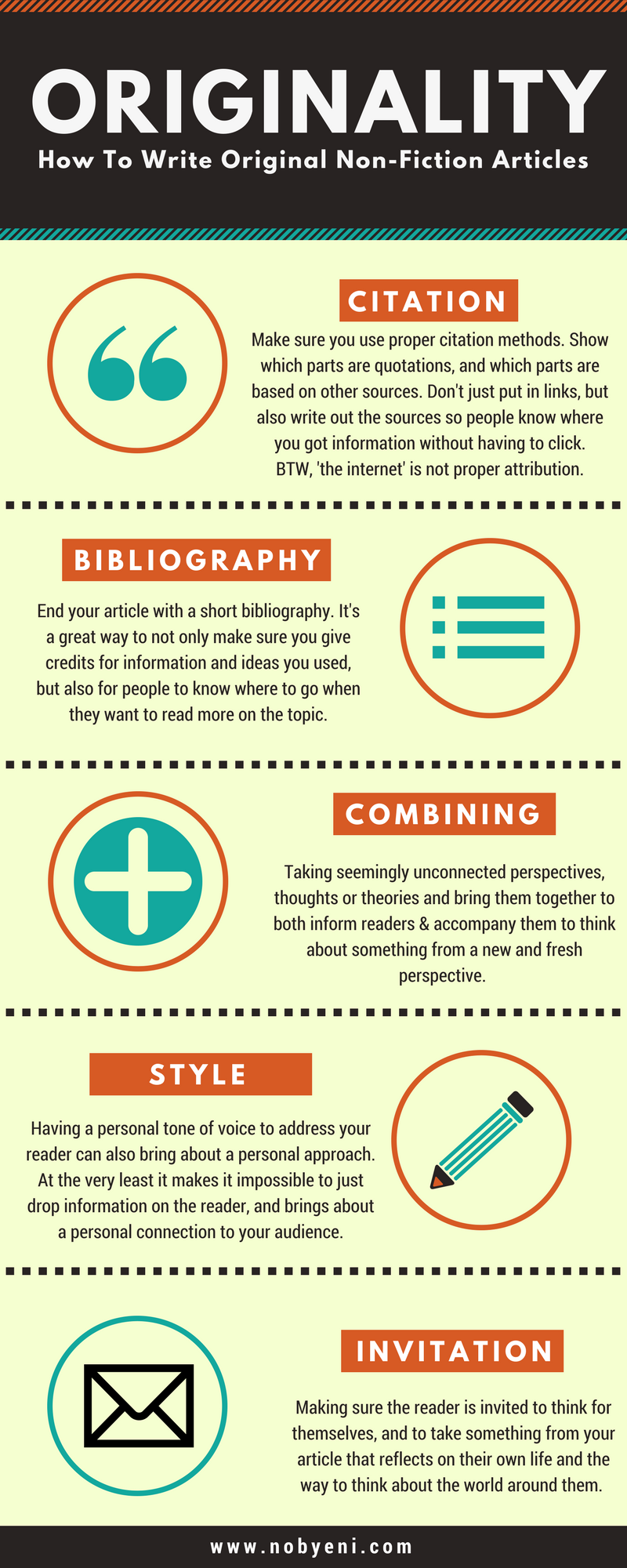There is a grey area between plagiarism and originality. Lately I have been amazed by how many people are able to write articles that fall exactly in that grey area.

Forget Plagiarism & Think About Sourcing Properly
I will not talk about plagiarism here. Lately several excellent articles were published on Steem on this very topic (for instance this plagiarism-guide by @steemcleaners). I would also recommend this excellent article on the different levels of copyright. And if you do find plagiarism on Steem, read this article to find out what you can do against it.
Please use appropriate formats for citing and add a bibliography at the end of your article listing all the sources you used, even if you haven’t quoted from them directly. Any material you use to get to your arguments needs to be listed somewhere. Use a consistent method, like the Chicago method. Use footnotes if you like, or in-line formatting. Don’t just insert a link, but name the whole source and add the link. This way the reader will both get all the information he wants, and will be able to easily determine you’re not a plagiarist. But to write an original article, you need to do more than properly citing your sources.
Is Originality Possible?
What I would like to talk about here is how can you move out of the grey zone, and really write an original article. For fiction this might seem easy. You just make up some character and put it in a specific situation or world and see what happens. But for non-fiction articles, don’t you always use sources to gather information? Yes, of course you do. But if you use sources, how then could anyone require you to be original?
Both writing fiction and non-fiction involves using your experiences, your way of looking at the world, all the things you’ve read before, and using them in some way. In that sense, maybe nothing is completely, fundamentally, original. You always use information from somewhere, even if you don’t remember where you got it from. Every word can be read in the dictionary so what is original about them?
But let’s put aside that question for now, as this is not meant to be a philosophical article. (I did write my PhD dissertation about this topic, so please forgive my philosophical tendencies.)
Writing Original Articles
In this age of the internet, I think it’s safe to say pretty much everything has already been written. That is to say, all information can be found somewhere. That doesn’t mean you can no longer write articles (or books) to convey information, but it does make it much more difficult. Taking information and spinning the words only slightly does not make something original. In fact, @steemcleaners considers it a type of plagiarism, and they are correct.
But if all information can already be found somewhere, why bother with this idea of ‘originality’? Well, because that is what writing is all about. To not just spin something, but to present it differently, originally, conceptually new. There are many gradations in this. Let’s go over a few. And I’ll try to give some examples.
What if you want to explain a phenomenon? Let’s say you want to write about what catalysts are. First of all, ask yourself why you want to write about this. If I want to get a scientific explanation, I will look up some encyclopedia where thorough information can be found. Or I will read a scientific paper about it. You will need to do something differently. You will need a specific approach that is both informative and personal.
A personal approach
One of the first steps towards an original article is to provide a personal approach. That doesn’t mean, per se, that you need to make it a personal, blog-style article. You can go this way, of course. But be aware that simply adding an introduction that tells your reader about how you found out about this topic is not very interesting to a reader that doesn’t know you. And it doesn’t make the rest of the article original either.
Example: combining perspectives
An effective manner to make your article personal and original is by bringing in an original approach. Something that is your personal touch. A classic way to do this is to combine two things that provide a different perspective. Two things that at first glance don’t seem to have a lot in common, but which together bring up an interesting new take on the topic. An example can be found in this article by @anikekirsten, in which she takes a book she read (for the TWBBookClub) and highlights a specific perspective that she found in that book--class struggle in the UK and the US at the beginning of the 19th century. Looking at the book through a specific concept developed by McLuhan, which would on its own not be original, but applying that to the social historical situation that is sketched makes for a very original article.
Example: using tone and style
There is another way to add a personal touch to your article: through style. Even though this is an excellent way to make your take on the topic original, please be aware that is most strong when combined with a personal approach to the content as well.
A good example of using a personal tone to add a personal approach to a non-fiction topic can be found in the articles by @tinypaleokitchen written as ‘Tiny Teaches’ and @therosepatch in her articles of ‘Cultivate your Prose with Rose’. Articles like this one on writing in limited POV and this one on loose body parts and how to keep them attached while writing fiction work well precisely because they bring general information in an almost informal manner. Using a very personal voice, both @tinypaleokitchen and @therosepatch know how to capture their audience from a different angle than any of those boring grammar websites. These articles linger on in your mind, because the personal tone touches you in a very personal manner.
A successful personal approach...
When you write an article with a personal approach, you realise you cannot simply quote large paragraphs and leave them while keeping the flow of the whole intact. You might want to quote some information, but without accompanying text around that quote, it wouldn’t make sense. Because you are taking the reader along on a road that you developed yourself, into a topic from your perspective.
Dropping information on the reader is not going to bring them along to the place you want to take them. You will need to chew on the information until you truly embody it. The more you master a topic, the easier it will be to present it in a personal matter. This is another reason why plagiarism or copy-pasting of even a single paragraph is an affront to writers. It shows a lack of commitment to the craft, as well as a complete lack of understanding of the topic itself.
Originality -- one more suggestion
Using a personal approach already sets you up to write something original. By combining theories, topics or perspectives, and by using a personal tone that suits both you and your audience, your article is turned into something more than a heap of information. But I would like to suggest one more level of originality can be added. This is not to say that the examples mentioned before do not do this. I’m only trying to say that when you only combine perspectives or add a personal tone, that still leaves room for improvement. I’m not sure this additional step towards originality is always necessary. Perhaps it’s a lot to ask when it concerns a short article on Steem. But when you’re writing a book or a longer series, and want to keep people interested, this extra bit seems to be a game-changer. Perhaps a way to distinguish between a good article and a great one.
The type of originality I mean adds a hint of humbleness. It doesn’t presuppose to know everything already or to provide a complete picture of what is going on. It opens up a topic for the reader, it allows them to do some of the thinking themselves. It inspires the reader to think, to consider things from a different perspective. It might use all kinds of information readers already know. But they will not have thought about it in this specific way, and it will make them think about other aspects about their lives or the world around them.
Perhaps this is a lot to ask. But there are articles that aim to do this. And all the best books have in common that they make you rethink the world around you.
Would you like to get feedback on your non-fiction articles before you publish them? Or to learn about writing by editing the work of others? @thewritersblock has several workshops for fiction, non-fiction and poetry where you can join a peer-review process to learn more about your own writing and about writing in general.




